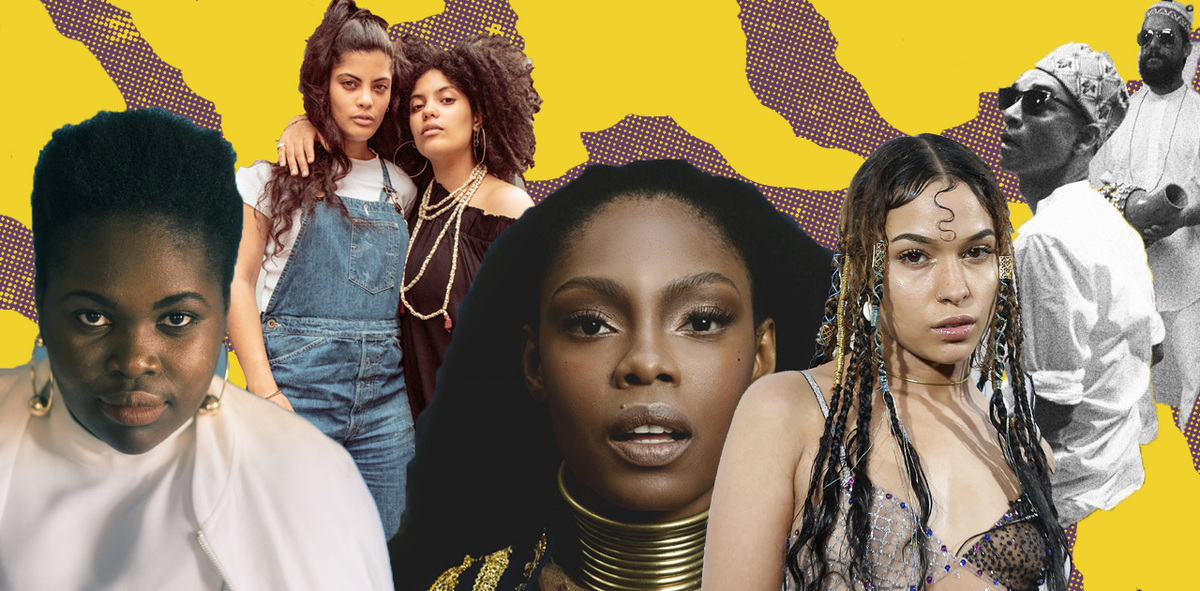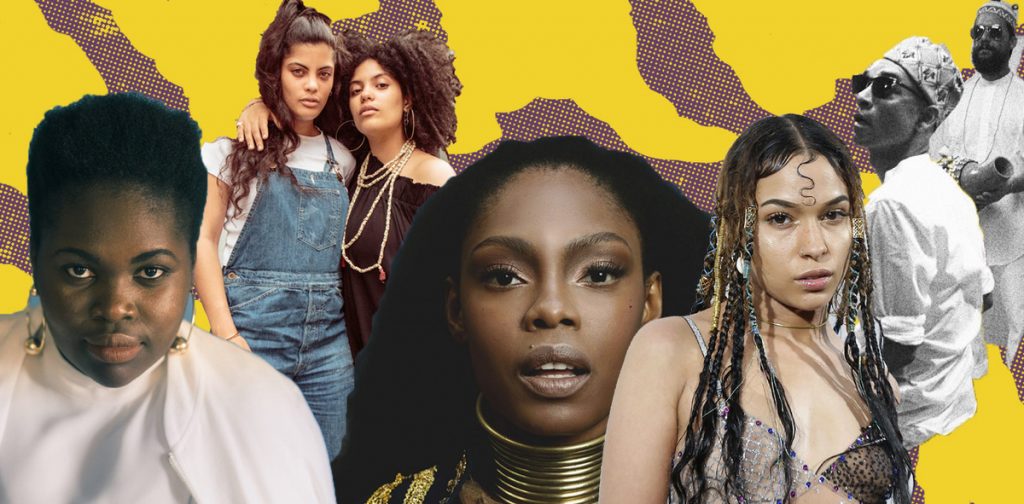Santería’s sacred influences are all over some of today’s best Latin music. Of course, the religion’s ceremonial rhythms and incantations have always held a place in Afro-Latino communities, yet they haven’t always entered into contemporary popular taste without backlash. Santería — a syncretic mashup of Christian doctrines and west and central African spiritual figures — inevitably carries with it a history that many in the Western world would rather care to forget. The formation of Regla de Ocha, as it is also known, harnesses the legacy of enslaved Yoruba peoples first brought to the solares of Cuba and the Americas.
Under the grips of slavery and later racist stigma, the practice of Santería and other Yoruba religions, like Brazil’s iteration of Candomblé, were often forced into secrecy. But in an age where ancestral belonging has become increasingly attractive, many have started loudly turning back to their roots. There are brujería collectives sprouting up across the States, television series like Netflix’s Siempre Bruja, and music artists across the diaspora who are passionate about infusing elements of Santería — from its orishas and imagery, to its ivory Santero/a ensembles — into their performances.
Yet upon first listen, there are times where those unfamiliar may not even realize Santería’s influence. The religious presence can feel subtle, as many of the artists on the list below take traditional Cuban batá rhythms into new territory altogether. Coupled with electrobeats, sprawling jazz stylings, and American hip hop flows, these songs emerge as Santería arrangements for the new age. And while they remain a gift for members of the Regla de Ocha, each song delivers an accessible glimpse into the spirit world for anyone who cares to listen. At best, you’ll hear your own slice of peace.
From New York rapper Princess Nokia to Cuba’s Orquesta Akokán, here are 10 artists reinventing the sound of Santería today.
ÌFÉ
When Otura Mun’s ÌFÉ burst onto the scene in 2017 with the electric IIII+IIII, it became clear just how boundless praise songs could be. IIII+IIII is titled for “Ejiogbe” — the Ifá representation for expansion and evolution in the universe — and certainly lives up to its namesake with diasporic tracks that blend dancehall beats, twinkling electropop synths, and devotional messages of sacrifice and acceptance from Yoruba deities. As for Mun, who took off in Puerto Rico as a DJ before devoting himself to the Santería branch of Ifá, his work with and beyond ÌFÉ is an experimental promise for practitioners yet to come.
Daymé Arocena
Cuban songstress and composer Daymé Arocena is on a visionary track. With her latest work, Sonocardiogram, the 27-year-old cemented herself as one of the most powerful voices in the game, brought up by her sacred frequencies and rich, Afro-Cuban jazz stylings. At the start of the record, Arocena highlights her own holy trilogía of orishas with songs to Oyá, Oshún, and Yemayá — Santería saintesses of the dead, of love and sensuality, and women’s prosperity respectively. The result is a sprawling, mercurial arrangement that does more to the soul than any work Arocena has already blessed us with in the past.
Okonkolo
Named for the smallest “baby” Batá drum used during traditional Santería ceremonies, Okonkolo’s work honors divine form but isn’t afraid to bring it to a new, hypnotic plane. On 2018’s modestly titled, Cantos, Okonkolo combines Western instrumental runs with the thumping sounds of un bembé — a party for the Orishas. Take “Yemaya,” for example, where Batá drums build atop a fleeting violin and whirling clarinet arpeggios. As the project of New York-born Chango santero and master percussionist, Abraham “Aby” Rodriguez, Okonkolo successfully brings listeners and orishas one step closer to each other, where they may meet between worlds.
Ibeyi
Twin sisters Naomi Diaz and Lisa-Kaindé Diaz took on the eponym Ibeyi — the Yoruba word for “twins” — back in 2013. Since then, the French-Cuban duo harnessed their syncretic beliefs in a series of projects steeped in the haunting energies of death and love. From tracks like Ash’s power anthem “Deathless” with sax king Kamasi Washington, to earlier work like “Oya” on Ibeyi, the Diaz women assert their Yoruba roots with true diasporic weight — combining the brooding electronica, jazz, and 808s of their American influences with the Yoruba rhythms of their ancestors.
Orishas
Orishas — the pioneering rap en español group from Cuba — have proudly repped Santería in their name from the very start. As in, for the past twenty years since they dropped their legendary debut effort, A lo Cubano. “Orishas is a powerful name [associated with spirituality],” the group told Remezcla in 2019, “so the music needed to be the same: powerful and great.” Members Yotuel, Roldán, and Ruzzo have only upped the ante since. Certainly powerful and great, tracks like “Bembé” bring syncretic hip hop taste to the devotional practice of a Yoruba spirit party. And in the music video for the track, we see a bow-and-arrow wielding depiction of one orisha, likely Ochosi, bringing balance and justice to star-crossed lovers.
Princess Nokia
Self-proclaimed bruja Destiny Frasqueri, aka Princess Nokia, is always vocal about her connection to Regla de Ocha. Given that her work as a New York City rapper is as multivalent as the city itself, Frasqueri takes what’s otherwise a quiet ancestral practice into the spotlight on tracks like “Young Girls” and 2017’s “Brujas” — infusing her spirituality with what it means to be a proud “ghetto bitch” of the African diaspora. Her standout track highlights a strong lineage from Yoruba to the indigenous Taíno peoples of her native Puerto Rico, acting as a clear primer for anyone unfamiliar with Caribbean spiritual history — and honestly, the labor is a gift.
Orquesta Akokán
If the Yoruba word “Akokán,” which means “from the heart,” is any indication, then you can expect each track on Orquesta Akokán’s titular 2018 debut to deliver a sound of true, heartrending devotion. Devotion to Cuba’s mambo, yes. Devotion to its big bands, to those 1940s and 50s bass and sax-heavy orchestras. And, of course, devotion to their island’s divine orisha forces. Members, including Cuban vocalist Jose “Pepito” Gomez, producer Jacob Plasse, and arranger Mike Eckroth, all unite on “Un Tabaco para Elegua” to honor the orisha of all caminos in life. Clearly, he has continued to guide their path: Orquesta Akokán were nominated at last year’s Grammy awards, and have been successfully touring the world since.
Serena Assumpção
As a practitioner of Candomblé, Brazil’s sister religion to the Caribbean’s own Santería, Serena Assumpção worked on Ascensão during her fatal battle with cancer. She passed at 39 years old, only months before the posthumous record was released. Assumpção’s gentle voice, which honored the likes of iemanjá (Brazil’s iteration of the sea goddess, Yemaya), remains with us on the album. Listening is a bittersweet reminder of her gifts, inasmuch as it affirms that her aché — her life force — continues to live on in this universe.
OSHUN
Taking their name from one of Santería’s most cherished and benevolent orishas, OSHUN have clearly set themselves up for “Blessings on Blessings.” The project is the brainchild of Thandiwe and Niambi Sala, two NYU students with an Afrofuturist mission. On their debut bittersweet vol. 1, OSHUN cradle hip-hop and R&B melodies with ease—Niambi stuns with her punchy flow, whereas Thandi’s harmonies add a necessary ethereal quality to their work. The result is a record of divine reckoning, without any stuffy doctrines.
Xênia França
Xênia França is one of Brazil’s most promising singers and composers, and to get there, she’s drawn on the energy of her ancestors. While her music identifies most closely with the sounds of Brazil’s Candomblé, she understands the linkages between Bahian and Cuban rhythms as part of one larger African diaspora. On tracks like 2017’s “Pra Que me Chamas,” França takes influence from Santería’s sacred batá, infusing it with Candomblé’s rum, rumpi, and lé atabaque drums all to punctuate her electronic aesthetic.




